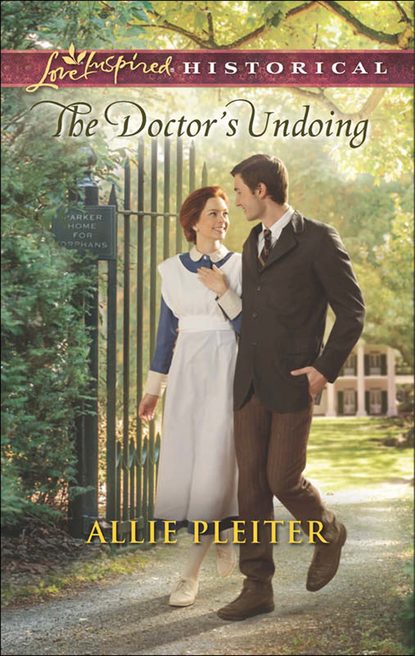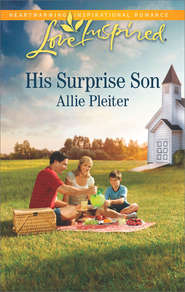По всем вопросам обращайтесь на: info@litportal.ru
(©) 2003-2024.
✖
The Doctor's Undoing
Настройки чтения
Размер шрифта
Высота строк
Поля
Ida sat on the side of her precious private bathtub Friday evening and gingerly toweled her hair. My, but a cool bath did wonders to ease the tightness of a hot Charleston day. She’d been at the Home all of five days, and had discovered that by supper she felt so sticky and tired it was a challenge to converse with the other staff at all. Maybe that’s why the children were so quiet at supper—perhaps the days sapped their energy, as well. But they were hardly more boisterous at breakfast. No matter what the reason, Ida just hated to think that life had beaten the joy out of so many children all at once.
She walked into her bedroom, glad again to catch sight of the cheery yellow curtains her friend Leanne had delivered this morning. Leanne Gallows had been her roommate at Camp Jackson, and the two had fast become dear friends as well as colleagues. Leanne had met her new husband, Captain John Gallows, at the camp in a whirlwind wartime romance with the happiest of endings. John and Leanne lived in Charleston for now, but would soon be heading up to Washington, DC to John’s new post in the diplomatic corps. It seemed a special grace that even when Leanne left, these bright yellow curtains would remain as a daily reminder. They brightened the room the same way Leanne’s friendship brightened Ida’s service in the long, difficult war.
The old curtains had been a horrid dark green, nearly as lifeless as the endless gray of every building wall. Today even the old red brick of the building exteriors seemed to boast more life than the dull walls inside. Where were the paintings? The drawings? The happy fixtures of a joyful home? How could children grow and thrive without color and light?
Ida let her hand run along the frilly yellow ruffles that now skimmed her windowsill. She couldn’t wait to watch the sunlight catch them tomorrow morning. Braiding her hair, Ida toured her three-room suite again, giddy at the luxury of so much space. Walking over to the bureau in her parlor—her heart bubbling Look at me, I have a parlor! for the tenth time as she did—Ida opened the bottom drawer, where she’d stowed her paints and charcoals. These new days at the Parker Home were like a feast for the quantity of fresh faces to draw. Even now her hand hovered over a set of sketching pencils, eager to capture that skeptical look in Donna Forley’s brown eyes or the sharp angles of Fritz Grimshaw’s brows.
Only one thing stopped her: the charcoal’s gray color. She couldn’t bear to bring one more drop of gray into this world—even with something as harmless as a sketching pencil. I’ve simply got to paint. Certainly there were a dozen tasks clamoring for her attention on her first free afternoon tomorrow, but none of them would be more satisfying than to paint. Just the thought of filling any blank canvas she could find with a festival of color lightened her spirits. Ida wanted to capture the gentle blue of Gitch’s mischievous gaze or the particular pink of Jane Smiley’s ears when she got mad.
Or the curious puzzle that was the color of Dr. Parker’s eyes. She’d never thought of a set of eyes as colorless before. Not that they were without hue, but they seemed to have no distinct shade. They were dark, surely, but even the darkest brown eyes had flecks of warmer tones in them. Dr. Parker’s seemed neither brown nor gray, and yet Ida knew they couldn’t be a true black, either. The artist in her longed to stare at them hard in good sunlight, to unlock the mystery of why she couldn’t see colors in those eyes.
Restless, Ida closed the drawer and returned to her bedroom windows. She opened them as wide as they would go, hoping to catch Charleston’s famed off-the-water evening breeze, but the night’s stillness prevailed. The heat was like a living thing here, pressing against one’s chest, pulling a soul down. Ida found she had to deliberately fight it, the same way a war nurse deliberately fought against sadness and despair. “Not even a foothold,” her nursing teacher would always say. “Mind your thoughts as much as you mind your sanitation, for both can infect with equal power.”
Guard my heart, Lord, Ida prayed as she slipped into bed, thinking even the thin sheet too much tonight. Already her night shift felt as if it were cementing itself to her arms. And if it’s not too much trouble, send a breeze.
An hour later, Ida turned over yet again, unable to get comfortable in the thick night air. No matter how much she needed sleep, it was nowhere to be found tonight. Her ability to nod off in even the worst of conditions had been a blessing at Camp Jackson—Ida couldn’t remember the last time she had trouble catching winks. “Fine!” she declared to the dark room, sitting up and reaching for the light. “Now what?”
She didn’t feel like reading. She’d already organized most of her things, and that sounded as if it would make too much noise anyhow. There wasn’t enough light to paint properly, and the black and white of sketching sounded entirely unappealing.
It wasn’t a breeze that the Good Lord sent, but an idea with just as much refreshment. Dashing to the bottom drawer of her bureau, Ida found her knitting needles. Leanne had taught her the craft at Camp Jackson, where many of the nurses worked in their free time to make socks for the thousands of soldiers who fought for freedom on tired, cold feet. Ida had become a competent knitter, even if the required soldier colors of navy, black and olive left much to be desired.
Now that the war was over, colored yarn had become one of life’s everyday luxuries. As a matter of fact, Ida was pretty sure she had just enough... “Aha!” she cried, as her hand found the small ball of bright pink yarn. It had been a gift from Leanne. A cheery bright pink was just the thing to lift her spirits.
Trouble was, the only thing Ida really knew how to make from memory were socks, and this ball wasn’t enough for a full-size pair, nor was it the proper thickness.
Unless the feet were very small. Surely, somewhere in all those children in all those sizes was a pair of feet tiny enough to fit whatever socks emerged from this yarn.
Grinning and wide awake, Ida peered at the ball and her needles, calculating if her memorized sock pattern could be adapted just enough to create a pair of small pink socks. “There’s only one way to find out,” Ida told the yarn in her hands. “I’m ready if you are, and it surely beats staring at the ceiling.”
Adjusting her lamp, Ida tucked herself into the chair by the window and began to knit.
* * *
Saturday morning had brought a drenching rain, a sweet relief to the choking heat that had pushed children and staff to the limits of their manners. While Daniel could always do without the mud puddles and the leak that invariably sprung in one roof or another, he was always grateful for the way a good “gully washer” could rinse the world fresh and clean. A smile found its way across his face as he walked in the welcome shade of the afternoon. Midsummer like this, rain perked up the plants around the grounds, coaxing out a few of the blooms that still graced the yards from the years when the property had been a grand estate. “The Home still has the bones of a great lady,” Mother was fond of saying, even though both women were showing their age. Time hadn’t been kind to either of them, and Daniel felt that sting more fiercely with every passing month.
“See how that makes a circle right there? How it meets that line from the other side?” He caught Miss Landway’s voice as he turned a corner toward the front of the compound.
“It’s just shapes?” a child’s voice, full of wonder, came in reply. Daniel slowed his steps, not wanting to intrude but still curious. He peered to his left to see Miss Landway seated on the stone bench by the front gate. She had a pair of girls on each side of her, more at her feet and a large pad of paper perched upright on her lap.
“Shapes and color. That’s how an artist sees the world.” She moved her hand over the paper, and Daniel shifted closer to improve his view. “Look at the gate and tell me what shape it is.”
“A rectungle,” one girl said. Miss Landway’s laugh chimed across the courtyard in reply.
“A rectangle, yes. Very good.” He watched her sketch out the shape in the center of her page. “But not just any old rectangle. What’s special about this one?”
“It’s got a moon on top,” Gwendolyn Martin, on the bench right next to Miss Landway, piped up as she pointed to the gate’s rounded arch.
The nurse’s smile was warm and bright as she nodded toward her seatmate. “Right you are, Gitch. The moon is also a shape, called an arch or a crescent, and if you plop that big old moon sideways on top of our rectangle—” she added the curve to the top of the drawing “—you get our gate.” Miss Landway spun the drawing around so that the girls at her feet could see, and a chorus of wide-eyed ooohs met her display. The part of him that worried how long the Parker Home could retain a nurse was happy to note she used the word our when she referred to the gate. Lord, You know I was looking for someone entirely different, but I’d still be grateful if this one actually stays. He could try to learn to see the world in colors and shapes if it meant she stayed here where she was most definitely needed.
As if she’d heard his thoughts, Miss Landway opened a tray of watercolors on her lap with a flourish and announced, “Now we’ve got to add the colors. Call out the ones you see.”
“The gate is black,” young Miss Martin offered.
“Only it’s got red and orange around the hinges and in spots on the side,” added another girl.
“The dirt is brown but the leaves are green,” another girl spoke up, pointing to the objects she named.
“But not the same color as those leaves over there,” came another comment. “Those are a different green.”
The children called out half a dozen colors and a few more shapes as they peered hard at the landscape before them. Miss Landway held up her pigments and had each girl match the color she saw with a color from the tray. For a woman who continually bemoaned the lack of color at the Home, she was wasting no time in digging up a palette right here. He stood and watched, fascinated, as she used each color to create a painting of the gate and the plants around it. Miss Landway had skill; the image was pleasant enough to hang in the staff dining room.
If only she had stopped there.
“The best thing about art,” she said once she’d finished with each child’s color, “is that we don’t just have to leave the world the way we found it. We can have more fun than that.”
Daniel felt his jaw go slack as Miss Landway dove into her palette and created a riot of hues around the gate. Under her enthusiastic brush, a full and wild garden sprung up around the gate on her paper. In a matter of minutes, two outrageously colored birds perched on the wall under a blinding yellow sun. A bright red house rose up beyond the gate whereas in real life only a dull gray shed stood on the other side of the street. Before she was finished, every inch of the paper was filled with motion and color until the canvas looked more like a tropical circus than the scene Daniel saw before her. When Miss Landway flipped the painting around to show the children, giggles and applause echoed across the courtyard along with her loud and musical laugh.
How had she done that? Daniel’s gaze flicked back and forth between the real-life gate and Miss Landway’s fantastical painting. It irked him that suddenly the Home’s serviceable but pleasant front gate now looked dull and dreary, even to him. He’d liked the gate just fine before, and ought to still like it now. He didn’t care for the funny, poke-in-the-ribs feeling Miss Landway’s artwork produced, nor did he care one bit for the sad dissatisfaction that filled the eyes of some of the children after a moment.
She didn’t realize what she had done. It would probably never occur to the plucky Miss Landway that she had just shown them a world they could never have, and left reality that much worse for the visit to a fantasy. How on earth was he to explain such a thing to the likes of Ida Lee Landway?
He walked over to the group, flipping his watch open as he came closer. Gwendolyn saw him first and stood up, a streak of fear in her eyes. They all looked as if he’d caught them doing something naughty, and that bothered him immensely. He took pains to soften his voice when he asked, “An art lesson, Miss Landway?”
“The girls wanted to watch me paint.”
“Our gate is a rectangle with a moon,” Gwendolyn pronounced. It bothered him that the little girl offered it like the grandest of compliments.
Miss Landway raised one eyebrow, a “what are you going to do with that?” gesture that made Daniel feel as if he were being tested. It should have been the other way around. Even ten minutes later, Daniel still hadn’t quite figured out how Miss Landway had turned the tables on him so that he walked away without uttering one word of the lecture on appropriate reality he had planned. An hour earlier, he had thought his biggest fear in regards to Miss Landway was the possibility that she would leave. Now he had a new fear entirely—that she would stay, and fill the children’s heads with dreams that were out of their reach.
His mother’s admonition echoed in his brain as he made his way back to his office, stumped and more than a little worried. “Be careful what you pray for—the Good Lord just might give it to you.”
Chapter Five (#ulink_47ce78de-2076-5e4e-84d1-b35a4fece979)
Daniel was just sitting down to enjoy his weekly indulgence of an hour’s quiet reading before Saturday supper when the sound of yelling reached his rooms. He put down his book and cocked his ear, listening. No, it wasn’t yelling, it was crying. Girls crying. Several girls crying. Something was most definitely amiss.
Ignoring his disappointment, Daniel pushed himself out of his chair and made for the door. The cries were coming from the dining hall, where Mrs. Smiley and the girls ought to be setting out the dishes for supper. Had someone cut themselves? Was one of the girls ill? He started walking in the direction of the noise, half expecting to be ambushed by one of the children or staff coming to get him, but he met no one on his way toward the torrent of girlish tears.
Of all the things Daniel steeled himself to see, a flock of angry girls slamming down tin plates in tearful fits was not on the list. No one seemed to be injured, but each of the five girls on supper table duty that afternoon was crying.
“I want some,” the youngest girl moaned as she slapped a napkin into place. “Why can’t we all have them?”
Daniel scanned the room for Mrs. Smiley, hoping for an explanation to the sea of unhappiness swirling before him. He found her, two tables away, having angry words with...with Ida Landway. While Mrs. Smiley was easy to irritate on a good day, Daniel was at a loss for what Miss Landway could have done to not only raise the ire of Mrs. Smiley, but each of these girls, as well.
Dodging past a sniffling nine-year-old brandishing a fistful of forks, Daniel made for the teacher. “Mrs. Smiley, what has gone on?”
Miss Landway’s eyes snapped up at the question, and Daniel could see the nurse was upset. It wasn’t surprising; despite her cheerful name, Mrs. Smiley’s tongue could curdle milk when she got angry—he’d had to have more than one conversation with the woman about keeping her temper under control. When the older woman turned, however, Daniel’s jaw slacked.
Baby Meredith Loeman, the youngest occupant of the Parker Home for Orphans at just over a year old, wiggled a pair of bright pink booties at him from Mrs. Smiley’s arms.











